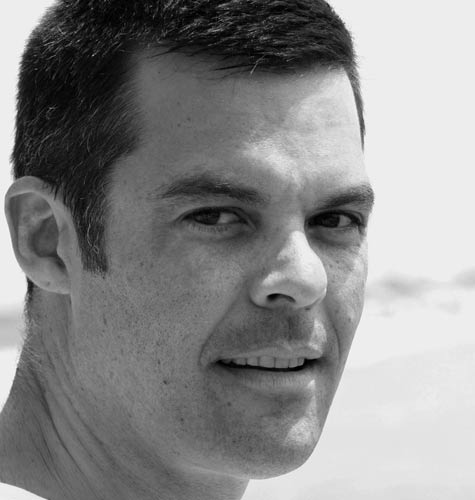
"I'M ALWAYS MANIPULATING LANGUAGE," SAID BOCK. |
When Adam Bock first came to Providence in the late '80s, after a friend told him there was this great playwriting teacher at Brown, he was busting with unstoppable aspiration. When Paula Vogel told him he had to start by studying acting and proving his writing skills, he agreed and eventually was accepted into her MFA writing program.
No, it's never been easy to discourage Bock. For example, in his third-grade Montreal classroom, he was cast as one of the oompa loompas in Charlie and the Chocolate Factory.
"I was not happy with that," he confesses, chatting animatedly at Trinity Rep before a rehearsal of The Receptionist. "So I went home and made my own version of James and the Giant Peach and made myself James. So we had two sort of rival theater companies in my third- and fourth-grade classes."
After that coup, the rest of his career might sound anti-climactic. The first play of Bock's that received serious attention was a decade ago, when an unknown in San Francisco; Swimming In the Shallows beat out plays from Berkeley Rep and ACT for a Bay Area best play award, though staged in a tiny, 50-seat gay basement theater, Theatre Rhinoceros. That primed the pump for further awards and successes. Moving to New York, where he now lives, his 2006 play Thugs won an Obie and paved the way for two plays to be staged there last year. Bock has written 13 so far. He is still going strong. Major Hollywood producer Scott Rudin is having him write a screenplay, the subject yet to be decided.
Bock, 47, is not sure why he stuck with plays rather than other kinds of writing. "I would try to write poetry, and I was a very bad poet. And I got exhausted writing fiction — because it's too long, you have to say everything."
But with plays you don't even have to bother saying "he said" and "she said." And besides: "I like spoken language. I'm very interested in that."
That fascination was locked in for good at a semester-long workshop after college (Bowdoin) at the O'Neill Theater Center, in Connecticut. "Anna Deavere Smith came in and taught us for three days," Bock says. "So that's where I first got interested in language, because she explained how she was capturing language by taping it and then playing it back through herself. She learned how to notate it so she could always come out the way it sounded. I got really charged up."
Paying close attention to how people talk, he began to notice how spoken language is so different from most talk on a page. "So many plays, I think, are actually written language that then the actor has to break up into their own pauses, or move through language to make it sound like spoken language?" he explains with a rising inflection that makes the observation sound like a question. "But what I'm interested in is what are the starts and stops of real language, and if I put them in to create drama, if there is a moment of drama, what happens to language? If I'm yelling at you, it doesn't come out sounding like a big speech, it comes out like a garbled mess — but you still understand the speech. That interests me very much."
This professional listener has worked as a receptionist himself, including when he interned at Trinity Rep during the years Richard Jenkins was in charge (1990-94). As a public relations assistant, he was frequently tapped to fill in for the permanent receptionist.
"I realized how many different languages you speak when you're a receptionist," he says. "You speak one way to the person on the phone you know, one way to the person you want to hang up with, one with someone you don't know, one with your boss, and then also with people walking in the door."
That's a crucial concern for any playwright, who after all is working with styles and modes of interactions as much as with words.
"So I'm always manipulating language," Bock says. "I'm always listening. I heard one time, these kids went: 'Nuh-uh.' 'Uh-huh.' 'Nuh-uh.' 'Uh-huh.' 'Nuh-uh.' 'Uh-huh.' 'No way — really?' That's what makes me laugh, that stuff. To hear those sounds."